| Reviews & Columns |
|
Reviews DVD TV on DVD Blu-ray 4K UHD International DVDs In Theaters Reviews by Studio Video Games Features Collector Series DVDs Easter Egg Database Interviews DVD Talk Radio Feature Articles Columns Anime Talk DVD Savant Horror DVDs The M.O.D. Squad Art House HD Talk Silent DVD
|
DVD Talk Forum |
|
|
| Resources |
|
DVD Price Search Customer Service #'s RCE Info Links |
|
Columns
|
|
|
Damo: The Undercover Lady Detective (MBC TV Series) (US Version - Limited Edition)
"Father, does someone who is sincere in everything smell like ink?" - Jae-Hui
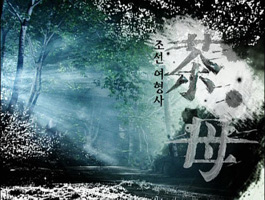
INTRODUCTION:
Airing on Korean television in 2003 and the object of a devoted fan following, Damo is an epic tale of love and duty in 17th century feudal Korea. Jang Chae-Ohk (Ha Ji-Won) is a "damo" for the Left Police Bureau, a term that literally means "tea servant" but carries a dual meaning of "undercover detective" for the purposes of this drama. Orphaned as a child and now a member of the servant class, Chae-Ohk's life is heavily constrained by her social status, and though she is an accomplished swordswoman and a keen detective with the respect of her coworkers, her status within society is little more than that of a slave. Her commanding officer, Hwangbo Yoon (Lee Seo-Jin), is the son of a nobleman and has been a friend and mentor to her since she was 7 years old. The two of them share a deep and unspoken love, but the difference between their social standings, in addition to Yoon's powerful sense of duty, forever keeps their relationship at a distance. This complex relationship must endure further hardship when through the course of a counterfeiting investigation, Chae-Ohk uncovers a massive rebel organization with designs on overthrowing the Royal Court, and to her dismay she begins to fall for their passionate leader, Jang Sung-Baek (Kim Min-Joon). Shakespearean in its scope as well as its execution, this 14-hour series weaves an intricate story of political intrigue, oppressive class distinctions, and the balance between duty, honor, and love.
CONTENT:
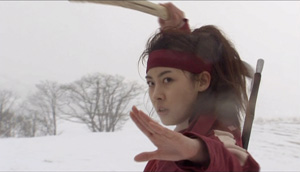 Set during the Chosun Dynasty, Damo depicts a world with strictly defined gender roles and a rigid class structure, and the way these distinctions affect the lives of the characters is the dominant theme of the series. As a woman, Jang Chae-Ohk technically cannot serve as a military or police officer; however, she can act as a tea servant to the police department, and basing the premise on Korean historical records, the series presupposes that using some of these tea servants in an undercover detective capacity was not an uncommon occurrence during this time period. Her abilities as a detective are as impressive as her skills with a sword, but class and gender distinctions force her to frequently pretend to be a man when assisting in police investigations.
Set during the Chosun Dynasty, Damo depicts a world with strictly defined gender roles and a rigid class structure, and the way these distinctions affect the lives of the characters is the dominant theme of the series. As a woman, Jang Chae-Ohk technically cannot serve as a military or police officer; however, she can act as a tea servant to the police department, and basing the premise on Korean historical records, the series presupposes that using some of these tea servants in an undercover detective capacity was not an uncommon occurrence during this time period. Her abilities as a detective are as impressive as her skills with a sword, but class and gender distinctions force her to frequently pretend to be a man when assisting in police investigations.
Commander Hwangbo Yoon is also affected by his class. While his father was a nobleman, his mother was only a concubine, and this level of nobility limits how far he can be promoted within the military ranks. It also makes it difficult for him to have a relationship with Chae-Ohk, whom he cherishes above all others. As she is of the servant class, a union between the two of them would diminish his status, and so she keeps her distance, in part, for fear of harming his career. Coupled with his strong dedication and loyalty to serving the Police Chief and by extension the King, their relationship remains often detached and complicated.
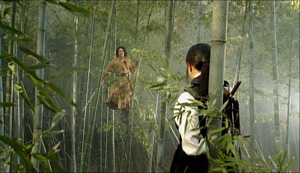 As the primary story begins, the Left Police Bureau is investigating a counterfeiting ring that appears to spread across the entire country and threatens to destablize the nation's currency. Through the course of their investigation, however, the Police Bureau finds that there is a much larger movement brewing beneath the surface, and at the heart of it is the rebel leader Jang Sung-Baek. After his father was accused of treason, Jang was taken from his home and raised by lepers where he saw firsthand how the caste structure demanded too great a sacrifice from the people. His vision for a future where the people are empowered is intoxicating, and he has built a small army of followers willing to die for him in pursuit of a new world. His passionate beliefs are also intoxicating to Chae-Ohk who often longs to see the world through his eyes and finds herself inescapably torn between these new feelings and her loyalty to a system that oppresses her.
As the primary story begins, the Left Police Bureau is investigating a counterfeiting ring that appears to spread across the entire country and threatens to destablize the nation's currency. Through the course of their investigation, however, the Police Bureau finds that there is a much larger movement brewing beneath the surface, and at the heart of it is the rebel leader Jang Sung-Baek. After his father was accused of treason, Jang was taken from his home and raised by lepers where he saw firsthand how the caste structure demanded too great a sacrifice from the people. His vision for a future where the people are empowered is intoxicating, and he has built a small army of followers willing to die for him in pursuit of a new world. His passionate beliefs are also intoxicating to Chae-Ohk who often longs to see the world through his eyes and finds herself inescapably torn between these new feelings and her loyalty to a system that oppresses her.
Where Damo finds its greatest success is in the intricacy of this political story and the characters embroiled in the struggle. Commander Hwangbo is loyal and dedicated and serves his country with great honor, but the kingdom he so faithfully serves is an oppressive one. Boss Jang is a rebellious criminal whose means are often violent and unforgiving, but his motives are valid, and his desire to help the people of his country is pure. While so many series would have more clearly defined "good guys" and "bad guys", most of the characters in this story are slaves to circumstance, fighting for a better world, just from different perspectives. Who is right and who is wrong can depend on how you look at it, and it makes the battle between these opposing forces a compelling one to behold. It also makes it easy to understand why Chae-Ohk is so torn. She isn't simply attracted to the rebel leader because he has long hair and a "bad boy" personality. The world he desires and the freedom with which he lives are the very things she has found herself so desperately wanting as well.
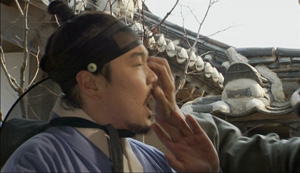 While the series focuses heavily on these three main individuals, Damo boasts a large cast of characters who are each developed in interesting ways and play key roles in the overall story. Lee Won-Hae, trusted leader of the elite Biho forces, adds a great balance between light-hearted detachment and dedicated intensity. Joh Seh-Ook is a strong presence as a Police Chief who is caught in the middle of so many opposing forces, including managing his son Chi-Oh and daughter Nan-Hui. Soo-Myung is very convincing as a liaison of sorts between Magistrate Choi and Jang Sung-Bake. Even Mah Chuk-Ji, a smalltime thief who is a thorn in Chae-Ohk's side in early episodes, proves to be a vital character in the building story. As the show progresses, it becomes clear that the 14-episode arc was very well thought out from the beginning, and it seems that none of the characters or situations is entirely superfluous.
While the series focuses heavily on these three main individuals, Damo boasts a large cast of characters who are each developed in interesting ways and play key roles in the overall story. Lee Won-Hae, trusted leader of the elite Biho forces, adds a great balance between light-hearted detachment and dedicated intensity. Joh Seh-Ook is a strong presence as a Police Chief who is caught in the middle of so many opposing forces, including managing his son Chi-Oh and daughter Nan-Hui. Soo-Myung is very convincing as a liaison of sorts between Magistrate Choi and Jang Sung-Bake. Even Mah Chuk-Ji, a smalltime thief who is a thorn in Chae-Ohk's side in early episodes, proves to be a vital character in the building story. As the show progresses, it becomes clear that the 14-episode arc was very well thought out from the beginning, and it seems that none of the characters or situations is entirely superfluous.
Not everything in this show works, however, and there are many scenes that are so eye-rollingly bad as to induce a headache. Some of the characters, while important to the story, often seem like they have little purpose but to run around screaming and whining. Ahn Byung-Taek, a member of the lower noble classes, is yet another person who is in love with Chae-Ohk, but for him it's more of an obsessive crush. The way he bumbles about trying to follow her around proves to be most annoying. The same can be said for Baek Ju-Wan, who is a very loyal officer, but is always grumbling about something meaningless and distracting from the story. Between the two of them and Byung-Taek's father Nok-Sa's slapstick antics, it's like watching a bad Three Stooges performance (complete with poking one another in the eyes), and these apparent attempts at comic relief fall completely flat.
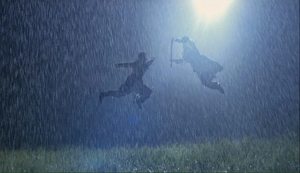 Another issue that must be addressed is the martial arts choreography. To move this story along, there are a significant number of action sequences, from sword fights to horse chases, and there's a real disparity between different scenes. Some of the sword fights are beautifully choreographed against breathtaking scenery and seem incredibly realistic, but many of them heavily rely on quick camera cuts that poorly attempt to create the illusion of a strong scene. At times, it doesn't even seem like Chae-Ohk knows where her sword is, let alone how to use it. In the world of television, time and budget are always a difficult concern, but it is still quite distracting to see such MTV-style editing in these fight sequences. Also, it's pretty clear during more than one of the horse chases that the riders are not going anywhere close to full speed. One final thing I had a real difficult time with was all the "wire-fu". Most of it was completely unnecessary and looked a bit silly, but I don't think it would have bothered me so much had there been some level of consistency. At times, characters were able to run through the air and fly over walls without much difficulty, and yet at other times, those walls were treated like massive obstacles. I can deal with a level of mysticism to the story, and there is plenty of that here, but I would have liked for it to be handled with a little more consistency.
Another issue that must be addressed is the martial arts choreography. To move this story along, there are a significant number of action sequences, from sword fights to horse chases, and there's a real disparity between different scenes. Some of the sword fights are beautifully choreographed against breathtaking scenery and seem incredibly realistic, but many of them heavily rely on quick camera cuts that poorly attempt to create the illusion of a strong scene. At times, it doesn't even seem like Chae-Ohk knows where her sword is, let alone how to use it. In the world of television, time and budget are always a difficult concern, but it is still quite distracting to see such MTV-style editing in these fight sequences. Also, it's pretty clear during more than one of the horse chases that the riders are not going anywhere close to full speed. One final thing I had a real difficult time with was all the "wire-fu". Most of it was completely unnecessary and looked a bit silly, but I don't think it would have bothered me so much had there been some level of consistency. At times, characters were able to run through the air and fly over walls without much difficulty, and yet at other times, those walls were treated like massive obstacles. I can deal with a level of mysticism to the story, and there is plenty of that here, but I would have liked for it to be handled with a little more consistency.
Damo is definitely a flawed work, and this is a flawed presentation (more on that later). It's a bit silly in the beginning, drags on some in a few of the middle episodes, and there are times when the camerawork feels like a bad Mexican soap opera. However, on the whole, the story itself is quite compelling, and the performances of Ha Ji-Won, Lee Seo-Jin, and Kim Min-Joon as the lead characters are very, very good. For all its flaws, this series succeeds because the story is strong, its cyclical approach is effective, and it gets increasingly better as it evolves from one episode to the next. The thought put into crafting such an intricately woven tale was worth the effort, and it makes the series worth watching.
PRESENTATION:
AUDIO/VIDEO
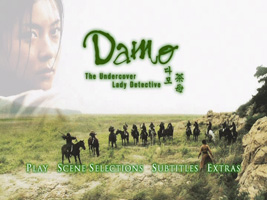 This English-language edition of Damo is packaged in a very sturdy and high quality outer casing. The right side panel discretely wraps around the side of the inner box with a magnetic seal, and when detached it opens along with the front panel to reveal an inner casing that contains the DVDs. The DVDs themselves are packaged in two oversized plastic cases that sit atop one another inside the outer case, and each disc contains artwork from the series printed on the label. It's a detailed and durable presentation.
This English-language edition of Damo is packaged in a very sturdy and high quality outer casing. The right side panel discretely wraps around the side of the inner box with a magnetic seal, and when detached it opens along with the front panel to reveal an inner casing that contains the DVDs. The DVDs themselves are packaged in two oversized plastic cases that sit atop one another inside the outer case, and each disc contains artwork from the series printed on the label. It's a detailed and durable presentation.
Damo was filmed in a widescreen (1.85:1) ratio, but it is presented on this DVD set in letterboxed 4:3 without anamorphic enhancement. For those of us with widescreen sets, this is most annoying, and it really hurts the overall presentation. The bulk of the video quality is above average, but there are some outdoor scenes that exhibit noticeable grain, some light edge enhancement throughout, and the color balance is a bit muted and uneven at times. With such amazing locations and settings, a better quality would have been nice, but the result certainly is well above average and captures most of the beauty of the Korean landscape.
The audio is a two-channel Dolby Digital mix that can best be described as adequate. It's a bit flat at times, and worse, there are a few spots where you can hear audible glitches in the soundtrack. The score itself is very beautiful if a bit redundant, and it sounds good but not great.
SUBTITLES
With so many characters and such an intricate story, it becomes very difficult to follow the action without paying very close attention to what is going on, so subtitles become an important aspect of the production. Normally, I would not dedicate too much time to subtitles, but since this version is specifically being marketed as the definitive edition for English-speaking audiences, I must address it in some detail. The biggest drawback of the subtitling is the all too frequent literal translations. I often found myself having to work backwards in my mind from the literal translation to what may seem like a plausible metaphor. So much subtlety of language is lost in a translation to begin with that adding confusing subtitling on top of it does the material a real disservice. Don't get me wrong ... they definitely get the point across, and the perceptive viewer can follow along, but watching brief clips of certain scenes from the MBC website, the disparity between high quality translations and those found on this set is clear.
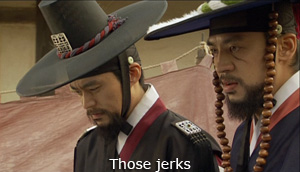 In addition to the fundamental issue with the translations themselves, there are numerous grammatical errors throughout, and I'm not talking about split infinitives and dangling modifiers. Words that sound alike are misused like "where" and "were" or "too" and "to", and while that may seem insignificant, it's real distracting to have to reprocess a sentence in your head because it didn't make any sense the way it was written while trying to keep up with the visuals on the screen and the fast pace of the next batch of subtitles.
In addition to the fundamental issue with the translations themselves, there are numerous grammatical errors throughout, and I'm not talking about split infinitives and dangling modifiers. Words that sound alike are misused like "where" and "were" or "too" and "to", and while that may seem insignificant, it's real distracting to have to reprocess a sentence in your head because it didn't make any sense the way it was written while trying to keep up with the visuals on the screen and the fast pace of the next batch of subtitles.
Another very frustrating aspect of the subtitling is that it only covers the dialog. There are a considerable number of times where text is displayed on the screen to indicate locations or further information on topics that even Korean viewers need to know, and none of that is accompanied with English text. Some of this information is borderline essential, and it would make it significantly easier on the viewer to not have to strain to figure it out from context.
Finally, the angered exclamations and potential swearing have all been awkwardly sanitized. Aside from a couple of instances, the only insulting name one character gives another is "jerk". A few times would be fine, but I'd wager there are over 100 instances of a character referring to another as a "jerk", and sometimes with odd redundancy: "Those jerks are real jerks!" There's absolutely no variety on this front, and it is most annoying. Along those lines, utterances are limited to "geez" and "dang": "Oh geez! Those dang jerks are real jerks! DANG!"
WHISTLES & BELLS:
The only additional feature on this set is the inclusion of a "Reference Guide". This is a small 26-page booklet that covers some of the more nuanced aspects of the show as well as addressing some confusion in the aforementioned subtitles. While "26 pages" sounds like a lot, there isn't that much content, and some of it is absurdly obvious (when the rebels all refer to one another as "brother", they're not all blood brothers), but some of what is there is pretty helpful. For example, one page explains how some ranking systems are ordinal (1 is better than 2), while others are more numerical (9 is better than 8). There is a specific scene that I found confusing until reading this section in the guide. Of course, in a nice bit of irony, the description of this difference misuses the word "chronological" while making its point.
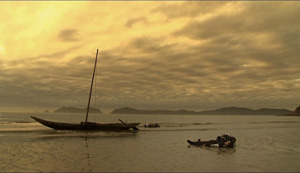
CONCLUDING THOUGHTS:
Damo was made for Korean television audiences. There is a level of subtlety to the cultural issues involved as well as the manner of speech that will be completely lost on most English-speaking viewers. The attempt made in this release to make it easier on the foreign viewer is only moderately effective, and if you are not prepared to dedicate significant effort to the story, it is unlikely you will find much enjoyment in it. However, for all its flaws, the intricate plot shows a depth of political and social interaction that is quite compelling, the visuals and landscapes are often breathtaking, and the love triangle between the three main characters is far stronger than one would expect and (to avoid spoilers) goes much deeper than what I have described in this review. As mentioned in the introduction, Damo is Shakespearean in both its scope and its execution, and if you have the patience and desire to see it through to its impressive conclusion, you will find it worthy of your attention. With better subtitles and some extras I'd feel much more comfortable suggesting people go online and buy this, but even as it is, I definitely have to Recommend it.
|
| Popular Reviews |
| Sponsored Links |
|
|
| Sponsored Links |
|
|
| Release List | Reviews | Shop | Newsletter | Forum | DVD Giveaways | Blu-Ray | Advertise |
|
Copyright 2024 DVDTalk.com All Rights Reserved. Legal Info, Privacy Policy, Terms of Use,
Manage Preferences,
Your Privacy Choices | |||||||














